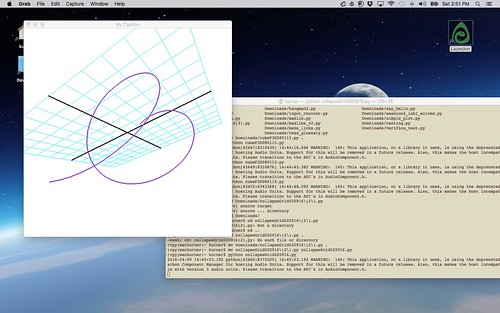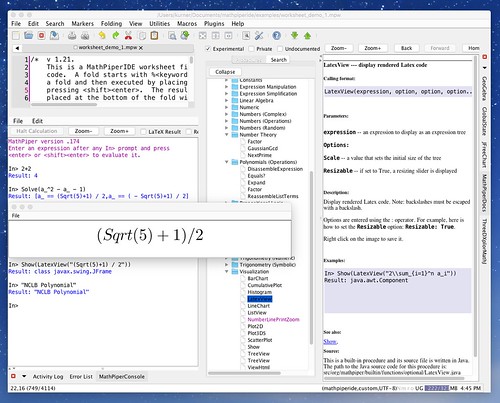:: running a Pygame module by Peter Farrell ::
Should Oregon's high school math teachers have professional development opportunities through higher education institutions? They do already, to some degree. But to what extent do institutions of higher ed take advantage of their business incubator programs?
If you dig down, you may find a code school or two in your town, staffed by avid geeks who have competence and confidence in the software world. This is the new world we're always rubbing up against in any high school mathematics class, and I'd argue in language arts too, as the Document Object Model (DOM) is what if not a model of a document?
Don't grammar, rhetoric and logic overlap with such a thing? Do we still teach any music? Video editing? Part of learning to code is learning to communicate about technical subjects, and that means making videos, not just writing PDFs or web pages.
The code school curriculum could counter boredom and perhaps complacency with some unfamiliar mathematics, to go with the novelty of a computer language taking over for the calculator (obsolete).
As long as the content is new, why not go all the way in some cases and use this program to introduce not just new ways of teaching the same old stuff, but new ways of teaching some new (GNU) stuff as well?
My list of semi-novel topics includes:
The laptop fan is on, given all the CPU-intensive compiling that's going on. First comes compiling the compiler, the latest gcc, with Fortran enabled (gfortran). Then comes another attempt to get Pygame working.
Homebrew warns against trying to work against an Anaconda install of Python; it's the framework Python 2.7 it wants to build against. But then I saw a promising formula on StackOverFlow... etc. OK, got it working.
Relatively painless was the install of MathPiper, a Java application.
If you dig down, you may find a code school or two in your town, staffed by avid geeks who have competence and confidence in the software world. This is the new world we're always rubbing up against in any high school mathematics class, and I'd argue in language arts too, as the Document Object Model (DOM) is what if not a model of a document?
Don't grammar, rhetoric and logic overlap with such a thing? Do we still teach any music? Video editing? Part of learning to code is learning to communicate about technical subjects, and that means making videos, not just writing PDFs or web pages.
The code school curriculum could counter boredom and perhaps complacency with some unfamiliar mathematics, to go with the novelty of a computer language taking over for the calculator (obsolete).
As long as the content is new, why not go all the way in some cases and use this program to introduce not just new ways of teaching the same old stuff, but new ways of teaching some new (GNU) stuff as well?
My list of semi-novel topics includes:
- a Group Theory spin (established mathematics, centuries old, but atypical in a high school setting);
- Fractals, the Mandelbrot Set in particular (also a familiar topic but not in high school unless the Complex Plane is well covered);
- the Concentric Hierarchy of Polyhedrons and their modular decomposition, along with Quadray Coordinates (completely alien, part of what I call Martian Math).
The laptop fan is on, given all the CPU-intensive compiling that's going on. First comes compiling the compiler, the latest gcc, with Fortran enabled (gfortran). Then comes another attempt to get Pygame working.
Homebrew warns against trying to work against an Anaconda install of Python; it's the framework Python 2.7 it wants to build against. But then I saw a promising formula on StackOverFlow... etc. OK, got it working.
Relatively painless was the install of MathPiper, a Java application.


